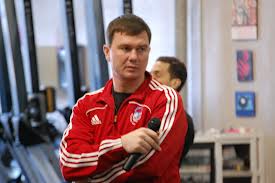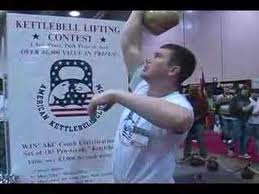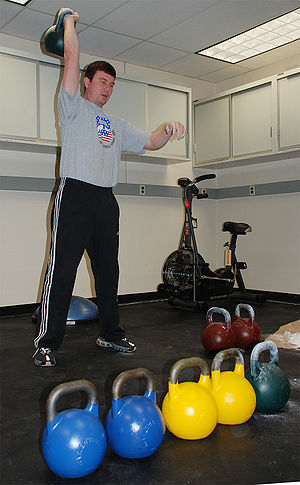Yesterday I was talking to Valery Fedorenko: we were actually discussing my own training programme for the next Pentathlon in March, and we got onto the subject of advice for kettlebell lifters (novices and experienced alike) training for pentathlon.
First off, Fedorenko had advice on each of the five lifts. We talked about his video What Is The Kettlebell Pentathlon?, and I asked if he felt there was more to add.
Q: So, if we look at the Clean, can you give advice about weights? Many of us choose to go heavier with the Clean, simply because it doesn’t involve an overhead lift, but I have seen you opt for the one weight for all five exercises. What would you say to a novice about this?
A: Yes, you can go heavy with the Clean. It’s the first exercise, so you are fresh, but then if you go as heavy as you possibly can you may not have sufficient energy for the later exercises. So, go heavier, sure, but maybe there’s no reason to do that: you need to look at the numbers and play about with your score, to see what’s going to work best for you.
Q: With the Long Cycle Press, lifters often fall into the trap of using the knees to assist the lift. This will be regarded as an “illegal” move in competition, so how can we best advise lifters on this?
A: It’s important to keep the Clean separate from the press, separate it off in your mind too. Complete the Clean, then think about locking the knees, and rotating the body to accelerate the lift. This will allow you to make the ballistic press you need. It shouldn’t be like a military press – the movement should start from the hip. If you keep the separation of the two parts of the exercise really clear in your mind, you won’t be so likely to rely on the knees, and if they are already locked you will be set to succeed.
Q: When performing the Jerk, some lifters make the mistake of letting their feet leave the ground. Apart from the move being disallowed in competition, what are the implications of the heel lift turning into a jump?
A: There’s no reason to leave the ground. Sure, in olympic lifting you might do this, but we aren’t going for 1 Max Rep! You will gain nothing, and you really don’t want to be wasting that extra energy, you’re going to need it for the reps. Forget about jumps and think fixation. If you focus on the fixation, it will guide you through the movement, and as soon as you get those knees locked completely, then you can drop the bell back into rack. It is the extension of the knees which will ensure that bell is at the top of the overhead hold, without any shaking. Hold it there for a second or so, then drop the bell. That’s the focus.
Q: I know from previous conversations with you that you consider the Half Snatch the most challenging of the five lifts. Why is that?
A: The Half Snatch is different from the Snatch in that the momentum on which every lifter relies gets interrupted by the rack hold. This makes it more challenging for the grip, and if you don’t get it right you might rip your callouses. It isn’t so easy to drop into the rack position coming from a snatch, and when you do you lose all that momentum which you worked so hard to create in the swing phase of the Snatch. But you can work well with a really heavy bell and just take it really slow, say 6rpm, with Half Snatch, because of that interrupt. With Snatch even 12rpm is too slow. The target reps for Half Snatch is only 18rpm, because of the demands of the lift. The important coaching points with Half Snatch are lock your knees to get that fixation, and make sure your arm stops when the raised arm gets parallel to the ear. Basic points, but the momentum can catch you out.
Q: The Push Press asks something different again of the lifter: it doesn’t have the momentum of the Snatch, and so it requires a lot of strength. How do you see it?
A: Yes, if you think of the lift in terms of legs and triceps, the Jerk is MUCH more about power emanating from the legs, and much less triceps. With the Push press there’s much more of an equal balance, more triceps. And it’s a simple lift: extend those knees into lock with each lift, keep heels down, and use the knees both with the lift and the drop.
Q: What do you see as the benefits of Kettlebell Pentathlon?
A: It’s something more people can cope with, because the sets are only 6 minutes long. it’s multi switch so again, it’s instantly manageable for more. It is a really comprehensive combination of push(press) and pull, and ballistics. The Clean is totally ballistic, the Long Cycle Press is both ballistic and press, the Jerk is ballistic, as is the Half Snatch. The Push Press is both ballistic and strength. The combination of the five lifts offers a more athletic training. Too much press makes you slow, but add in that element of ballistic skill, and you will be a better athlete for it. The ability to mix up the weights gives you more flexibility too, so that the set becomes what is best for you, not too generic. Even a novice, once they have mastered the five lifts to a certain degree, can enter a Pentathlon competition and get a score. So what if they only clean at 5rpm? If they can achieve rack position and overhead fixation, they can consider themselves a competitor. It’s a great start.
Q: Does Pentathlon training prepare you for anything else, or simply for Pentathlon?
A: Well, I see Pentathlon training as good preparation and great conditioning. From this you might move on to Biathlon, or Long Cycle or Juggling, even. From this level of training, you will get an idea of where you might want to take it next. But it’s also an excellent gauge for athletes of any discipline, as it will really show them about their ballistic fitness.
Q: Can a Kettlebell Pentathlete continue to progress?
A: Yes, you can always progress. You can start to experiment with hand switches, trying switching at 3 minutes for example, rather than the usual 1 minute switches that I recommend initially. Any switch timing is possible.
We closed the discussion by talking about Fedorenko’s own experience with Pentathlon. I asked him about his PR with Pentathlon, and he said he can jerk and clean with 60kg, but it will be relatively slow, might not gain the most points. Even for a champion then, it’s going to be worth doing the sums.
To everyone who has entered, or is considering entering, a Pentathlon in 2013, the best of lifting success!



